When it comes to choosing a bathroom countertop, there are a wide variety of materials, styles, and designs to consider, each offering different benefits depending on your personal preferences, budget, and bathroom layout. Whether you’re designing a new bathroom or renovating an existing one, your choice of countertop can dramatically impact the overall look and feel of the space. The countertop is one of the most prominent features of the bathroom, and selecting the right material can elevate the room’s aesthetic while also providing functionality and durability.
One of the most popular materials for bathroom countertops is quartz. Quartz countertops are engineered stone, made from a combination of natural quartz and resins. They’re incredibly durable, non-porous, and resistant to stains, scratches, and moisture, making them an ideal choice for a bathroom where water and humidity are constant factors. Quartz also comes in a wide range of colors and patterns, so you can find a style that fits seamlessly into your bathroom’s design, whether you’re aiming for a modern or traditional look. The low-maintenance nature of quartz is another significant advantage, as it doesn’t require sealing and is easy to clean with just soap and water.
Marble countertops, on the other hand, offer a luxurious and timeless look. The natural veining and patterns in marble create a unique aesthetic that can add a touch of elegance to any bathroom. While marble is undeniably beautiful, it does require more maintenance than other materials. Marble is a porous stone, meaning it can absorb water and stains if not properly sealed. Regular resealing is necessary to keep it looking pristine, and you’ll need to be cautious about spills, especially from products like makeup or lotions that can leave stains. Despite the extra care required, many homeowners feel that the beauty of marble is well worth the effort.
Granite is another natural stone option that has been a popular choice for bathroom countertops for many years. Known for its durability and resistance to scratches and heat, granite is an excellent option for high-traffic bathrooms. It’s available in a variety of colors and patterns, ranging from subtle neutral tones to bold, dramatic designs. Like marble, granite does require sealing to protect it from moisture and stains, but it is generally easier to maintain. With proper care, a granite countertop can last for decades, making it a long-term investment for your bathroom.
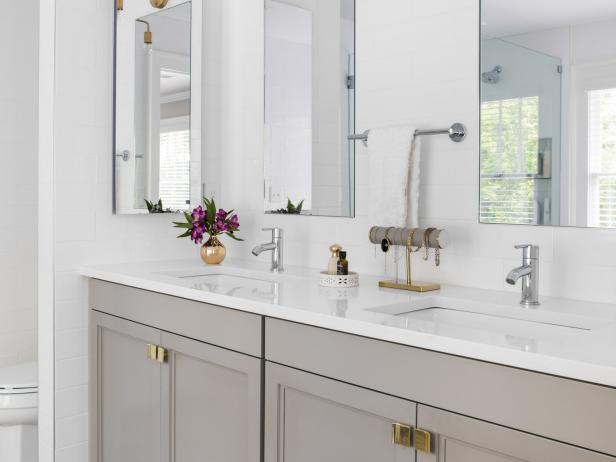
If you’re looking for a more budget-friendly option, laminate countertops can offer a stylish solution at a fraction of the cost of natural stone. Laminate has come a long way in terms of design, and today’s laminate countertops can mimic the look of stone, wood, or even concrete. While laminate is not as durable as quartz or granite, it is water-resistant and easy to clean, making it a practical choice for bathrooms. One downside to laminate is that it can be prone to scratches and burns, and once damaged, it’s difficult to repair. However, for those on a tight budget, laminate can be a cost-effective way to achieve a stylish bathroom design.
Solid surface countertops, such as Corian, are another great option for bathrooms. Made from a blend of acrylic and natural minerals, solid surface countertops are non-porous, making them resistant to water, stains, and bacteria—an important feature in a bathroom setting. Solid surface countertops are available in a variety of colors and patterns, and because they’re man-made, they can be molded to fit unique spaces or designs. They’re also relatively easy to maintain, although they can be prone to scratches. The good news is that minor scratches can be buffed out, making solid surface countertops a durable and low-maintenance choice.
For those seeking a more eco-friendly option, recycled glass countertops offer a beautiful and sustainable alternative. These countertops are made from recycled glass fragments embedded in a resin or cement base, creating a striking, one-of-a-kind look. Recycled glass countertops are not only environmentally friendly but also durable and easy to clean. However, they can be more expensive than some other options, and they may require occasional sealing to protect the surface from moisture.
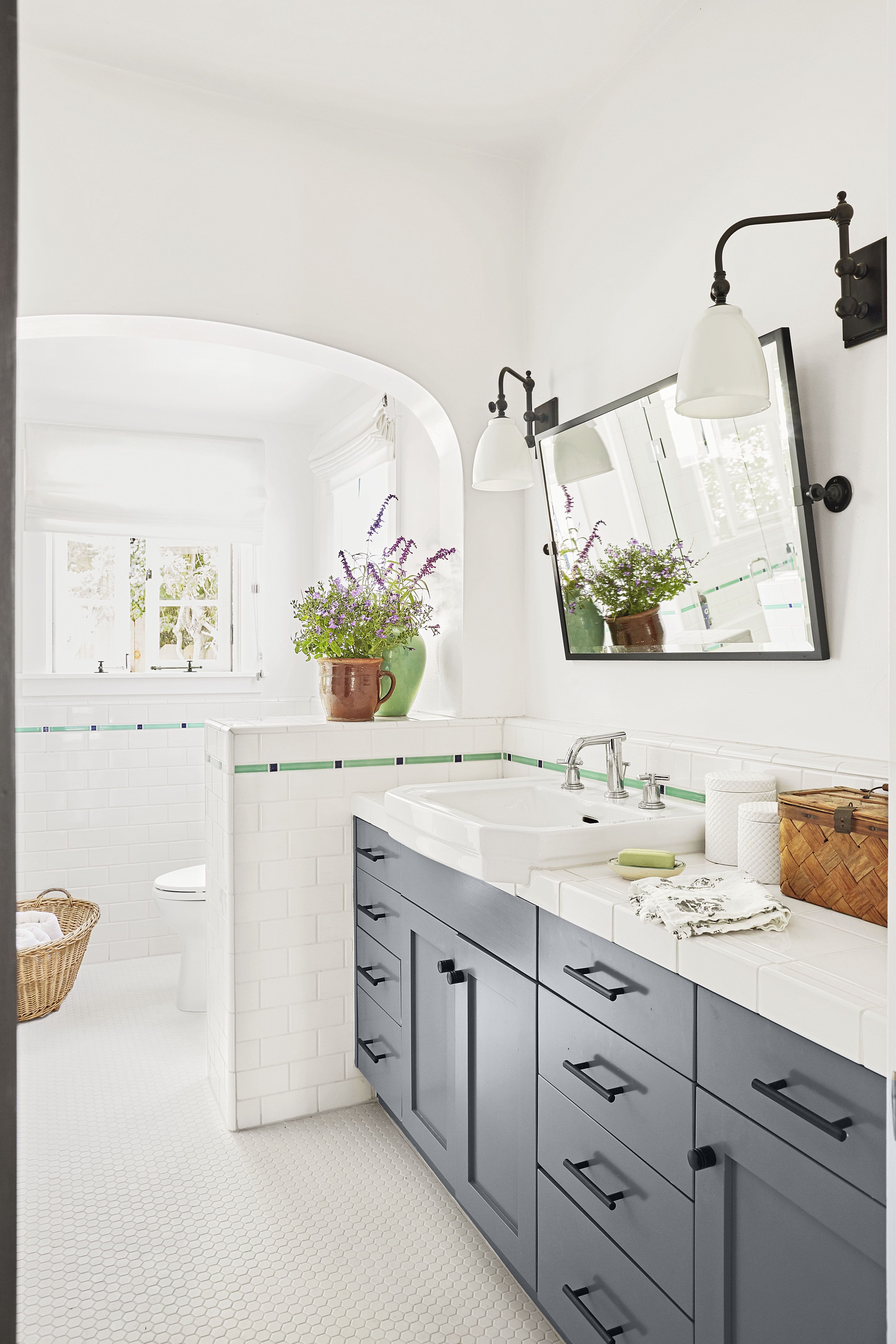
Concrete countertops have gained popularity in recent years, particularly in modern or industrial-style bathrooms. Concrete offers a unique, customizable look, as it can be cast into virtually any shape or size and can be tinted or stained in a range of colors. It’s also highly durable and can withstand heat, scratches, and water when properly sealed. However, like natural stone, concrete is porous and will require regular sealing to prevent stains and water damage. The weight of concrete can also be a consideration, as it may require additional support in your vanity or cabinetry.
Wood countertops, while less common in bathrooms, can create a warm and rustic feel in the space. Wood countertops, especially butcher block or reclaimed wood, can add a natural, organic element to the bathroom design. However, wood is highly susceptible to water damage, so it’s essential to use a waterproof finish and regularly maintain the surface to prevent warping, mold, or mildew. While wood countertops require more care than other materials, they can create a cozy, unique look that stands out in the bathroom.
If you prefer a sleek, minimalist look, stainless steel countertops might be the way to go. While more commonly found in kitchens, stainless steel can also work well in modern or industrial-style bathrooms. Stainless steel is non-porous, making it resistant to water, stains, and bacteria, and it’s incredibly durable. It’s also easy to clean, although it can show fingerprints and water spots. The reflective surface of stainless steel can help brighten up a small bathroom, but it can also feel cold or clinical to some people, so it’s important to consider the overall aesthetic you’re going for.
Another versatile and stylish option is tile countertops. While tile is more commonly used for backsplashes and flooring, it can also make a striking countertop surface. Tile comes in a wide range of colors, patterns, and textures, allowing you to create a unique design that fits your bathroom’s style. One of the downsides of tile countertops is the grout lines, which can be prone to staining and mildew if not properly sealed. Regular cleaning and sealing are necessary to maintain a tile countertop, but with the right care, it can be a durable and beautiful choice.

If you’re interested in a natural, earthy look, soapstone countertops might be a great choice for your bathroom. Soapstone is a natural stone with a smooth, matte finish that can add warmth and character to the space. It’s non-porous, so it’s resistant to water and stains, and it doesn’t require sealing like other natural stones. However, soapstone is softer than materials like granite or quartz, so it can be prone to scratches and dents. Fortunately, these imperfections can often be sanded out, and many people appreciate the natural patina that soapstone develops over time.
Another emerging trend in bathroom countertops is the use of porcelain slabs. Porcelain is incredibly durable, resistant to heat, water, and stains, and available in large-format slabs that minimize the need for seams. Porcelain countertops can mimic the look of natural stone, wood, or even concrete, giving you a wide range of design possibilities. Porcelain is also non-porous, making it hygienic and easy to clean—an important factor in a bathroom setting. One of the biggest advantages of porcelain is its versatility, as it can be used for countertops, walls, and even shower enclosures to create a seamless look.
If you’re looking for a high-end, luxurious option, onyx countertops can create a stunning focal point in the bathroom. Onyx is a translucent stone with striking patterns and colors, often used to create a dramatic, statement-making design. While onyx is undeniably beautiful, it is also one of the more delicate countertop materials. It is softer and more prone to scratches and staining than granite or quartz, so it requires regular maintenance and careful use. For homeowners willing to put in the extra effort, onyx can transform a bathroom into a luxurious, spa-like retreat.
In summary, choosing the right bathroom countertop involves considering a balance of style, durability, maintenance, and budget. With so many materials to choose from—whether you’re drawn to the durability of quartz, the luxury of marble, the affordability of laminate, or the eco-friendliness of recycled glass—there’s an option for every bathroom and every homeowner’s taste. The key is to think about how the countertop will be used, how much maintenance you’re willing to commit to, and how it fits into the overall design of your bathroom. With thoughtful planning, your new bathroom countertop can enhance both the functionality and beauty of your space for years to come.
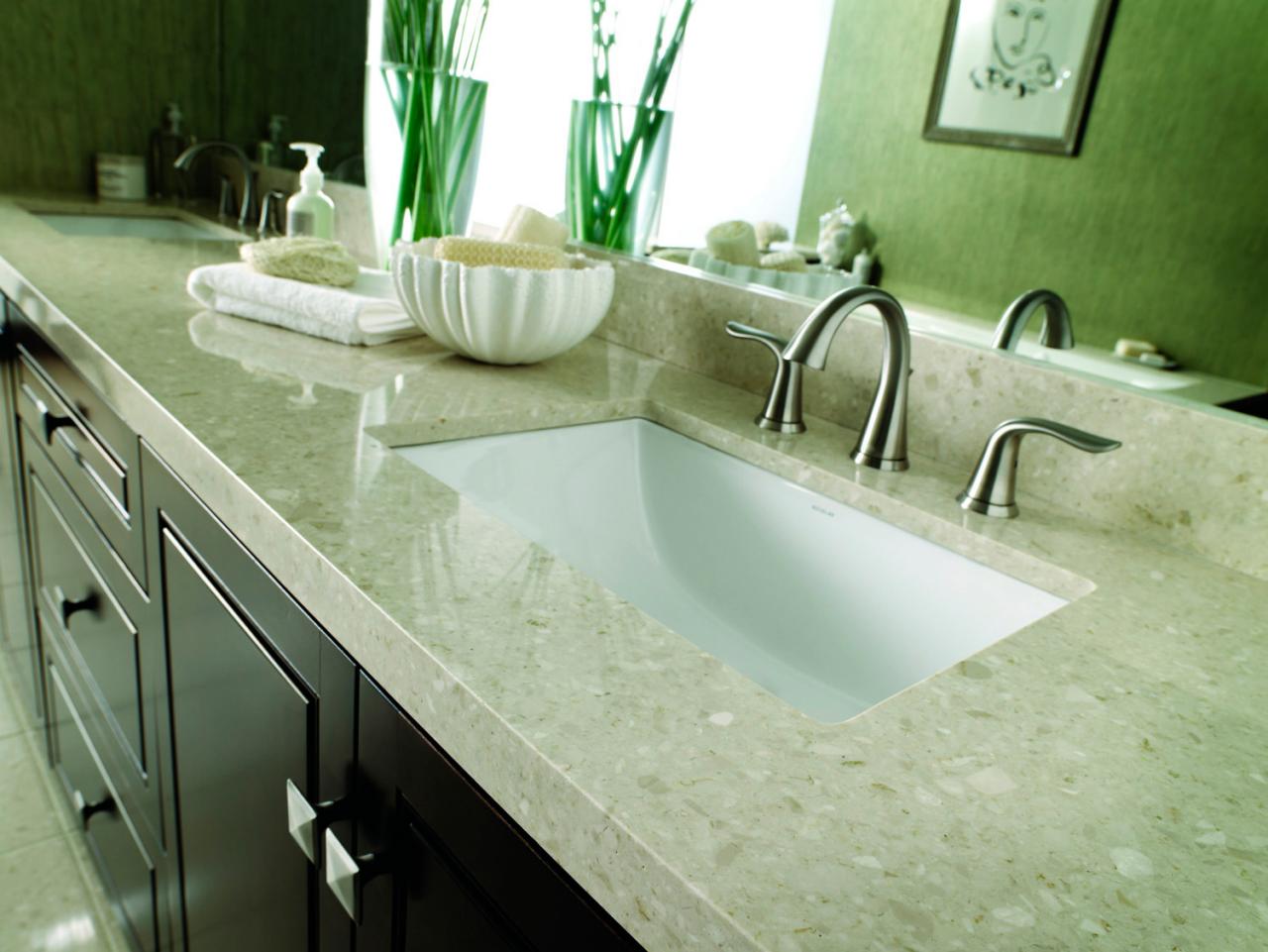
Common Mistakes to Avoid
Choosing the wrong material for your lifestyle: Selecting a countertop material based solely on appearance without considering its durability and maintenance needs can lead to frustration. For example, marble looks stunning but may not be ideal for a high-traffic bathroom due to its susceptibility to stains and scratches.
Ignoring the need for proper sealing: Many natural stone countertops, such as granite and marble, require regular sealing to protect them from moisture and stains. Failing to seal the surface properly can lead to damage over time.
Overlooking maintenance requirements: Some countertops, like wood or concrete, require more upkeep than others. Make sure you’re prepared for the level of maintenance involved in caring for your chosen material to avoid premature wear and tear.
Underestimating the impact of water and humidity: Bathrooms are constantly exposed to moisture and humidity, so choosing a material that can withstand these conditions is crucial. Avoid materials that are too porous or prone to warping, such as untreated wood.
Neglecting to match the countertop with the overall design: While it’s easy to fall in love with a specific countertop material, it’s important to ensure that it complements the rest of the bathroom design. Consider how the countertop’s color, texture, and style fit with the flooring, cabinetry, and fixtures.
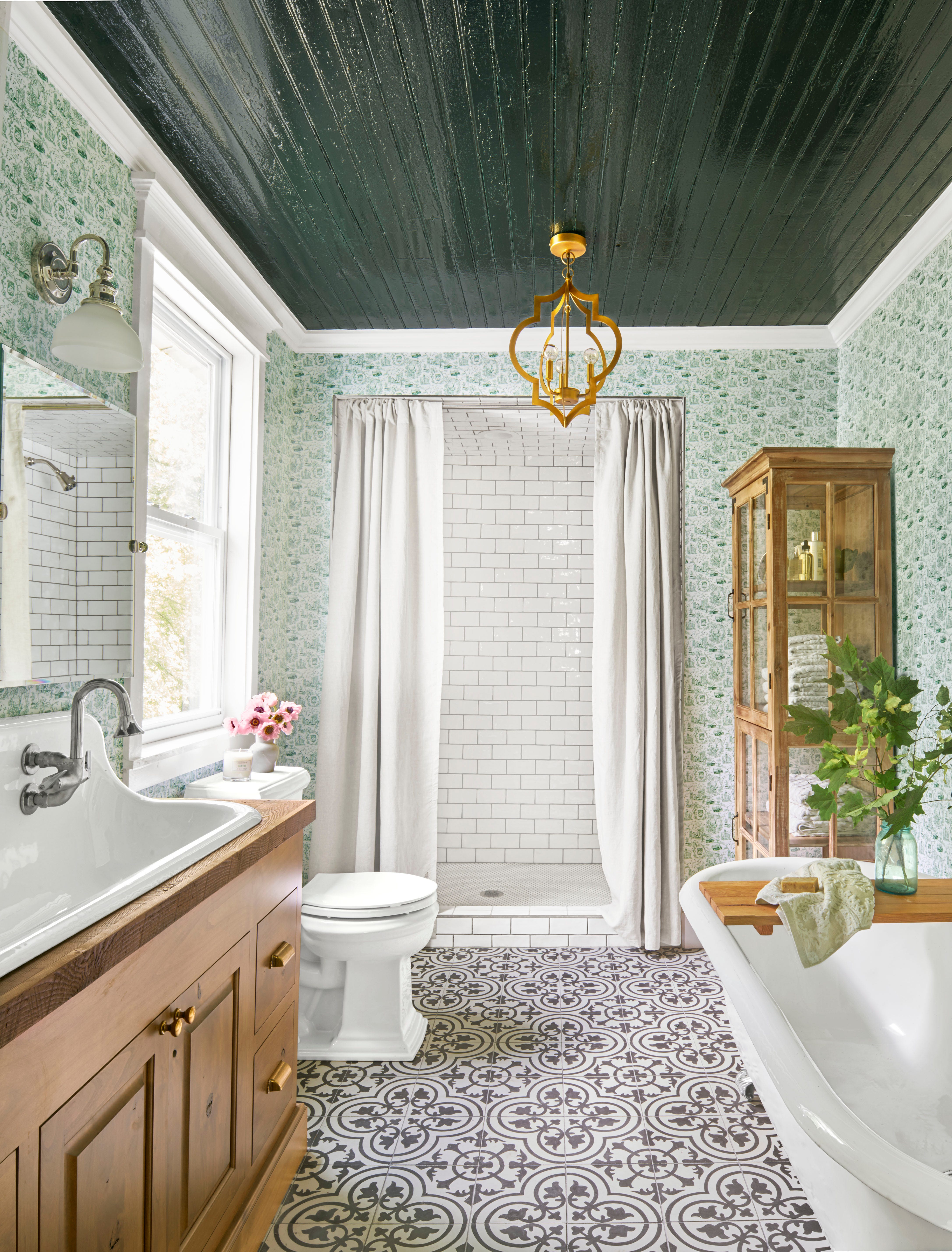
What is the most durable material for bathroom countertops?
Quartz is one of the most durable materials for bathroom countertops. It’s non-porous, resistant to stains, scratches, and moisture, and doesn’t require sealing like natural stone. Granite is also highly durable but needs regular sealing to maintain its resistance to moisture and stains.
How do I maintain marble bathroom countertops?
Marble countertops require regular maintenance to keep them looking beautiful. You’ll need to seal the surface every six months to a year to prevent staining. Avoid using harsh or acidic cleaners, as they can damage the marble. Clean spills immediately to prevent them from seeping into the stone.
Are laminate countertops a good option for bathrooms?
Laminate countertops can be a budget-friendly option for bathrooms. They’re easy to clean, water-resistant, and come in a wide variety of designs that mimic more expensive materials like stone or wood. However, laminate is not as durable as quartz or granite and may be prone to scratches or burns.
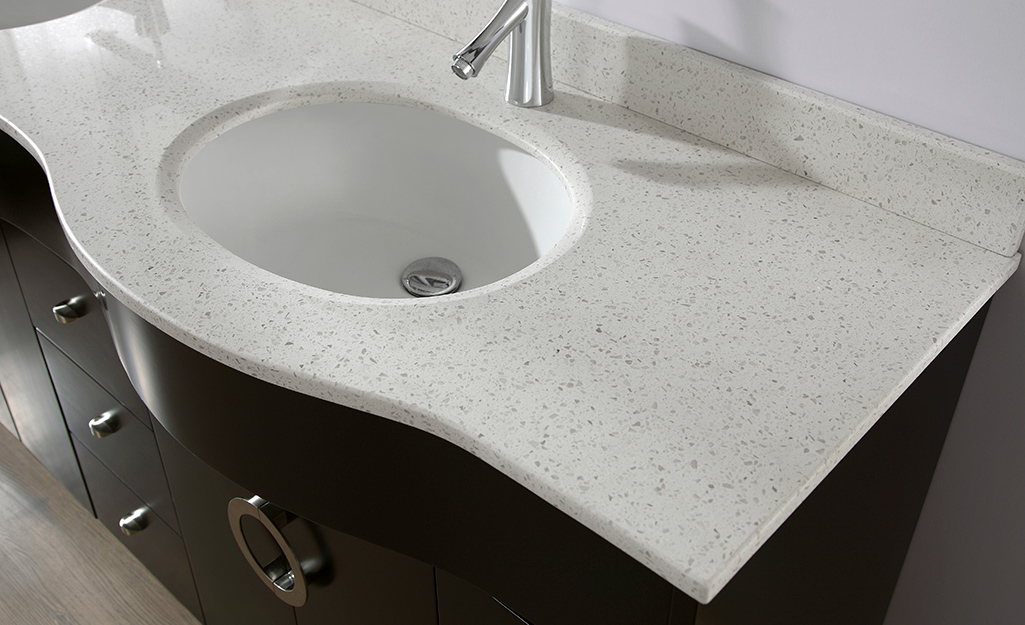
Can I use wood countertops in a bathroom?
Yes, wood countertops can be used in a bathroom, but they require proper sealing and regular maintenance to protect them from moisture. Using a waterproof finish and reapplying it as needed is essential to prevent water damage, warping, or mold growth.
What countertop material is best for an eco-friendly bathroom?
Recycled glass countertops are a great eco-friendly option for bathrooms. They’re made from recycled glass embedded in a cement or resin base, creating a unique, sustainable design. Bamboo and reclaimed wood can also be environmentally friendly choices, but they require more maintenance.
How often should I seal natural stone countertops in the bathroom?
Natural stone countertops, such as granite, marble, or soapstone, should be sealed at least once a year to protect them from water, stains, and damage. In high-moisture environments like bathrooms, you may need to seal the countertop more frequently, especially if you notice water absorbing into the stone instead of beading on the surface.
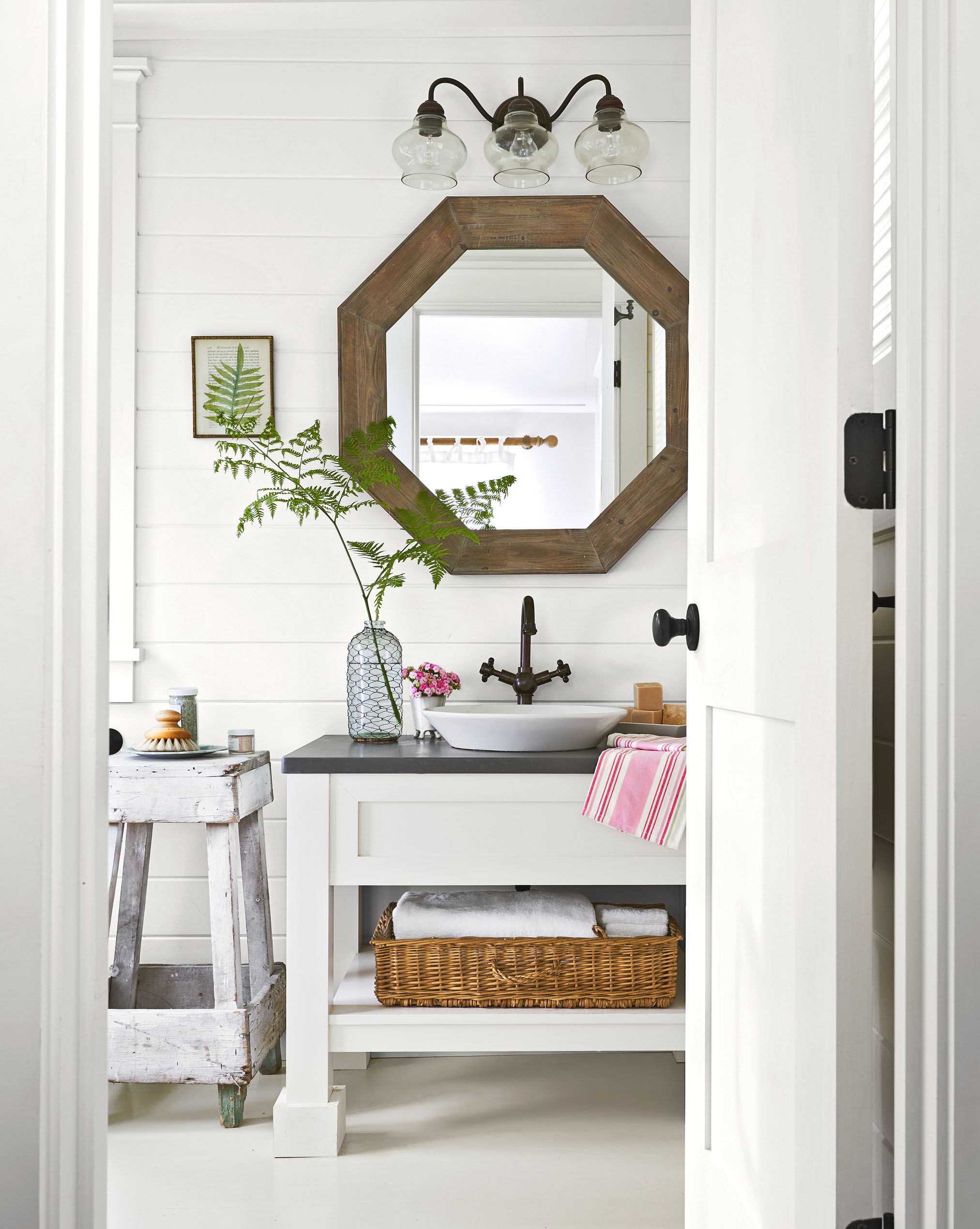
Best Bathroom Vanity Tops
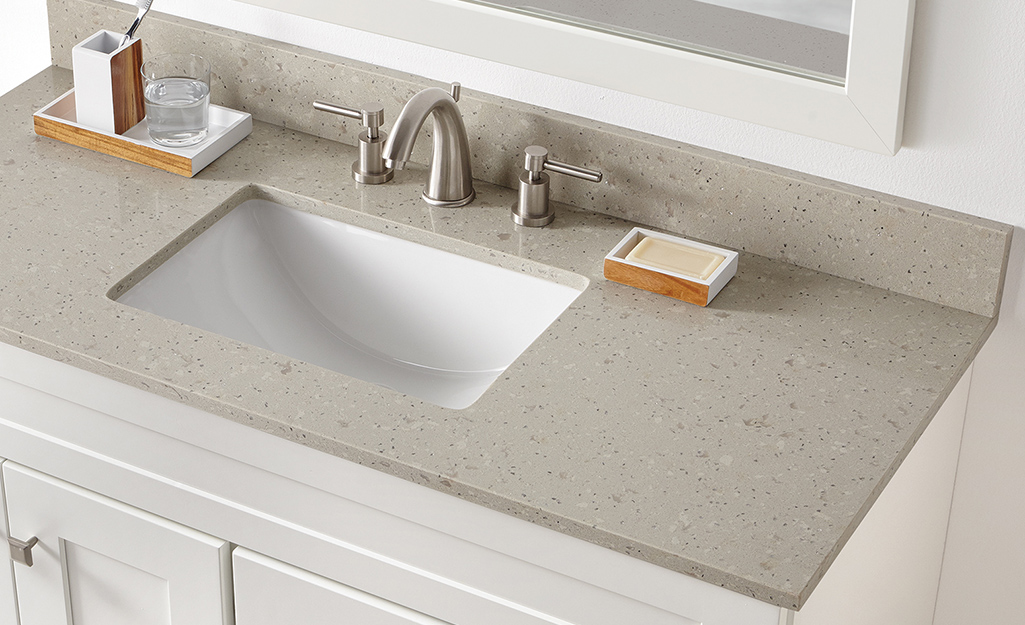
Bathroom Countertop Material Options
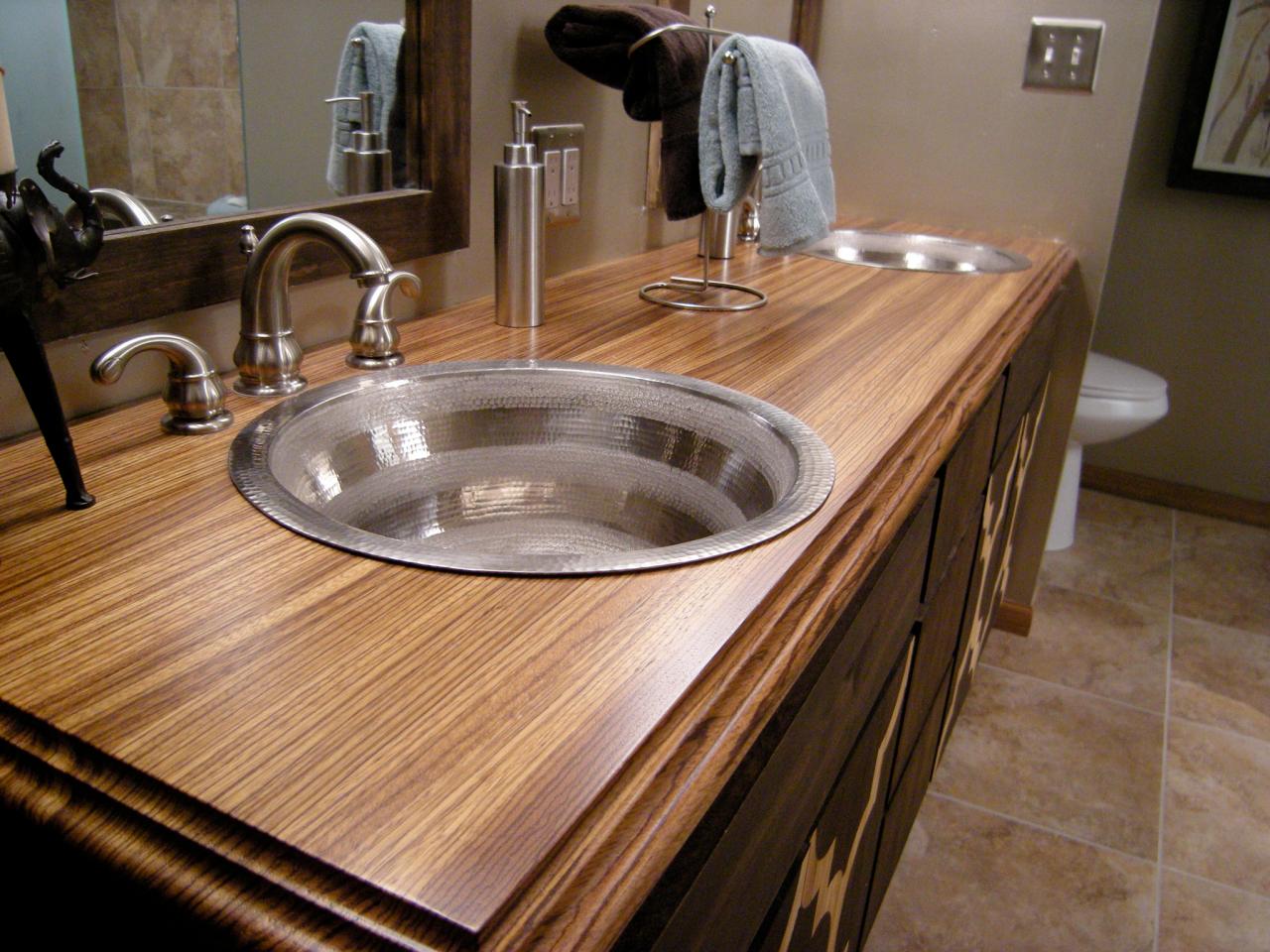
Related articles: